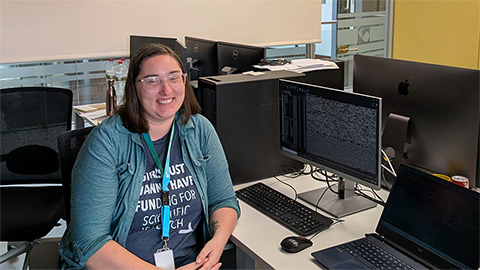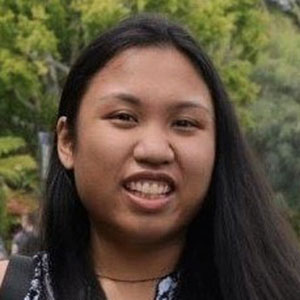How volunteering enriched my life as a Ph.D. student
At a recent Saturday Science outreach event, we focused on teaching children what the brain is and how it works. At my assigned station, I presented several human skulls and a sheep skull to show what protects the brain and how skulls differ among species.
“Whoa, that skull is real?” “That’s so cool!” “Can I touch it?” Most of the children were amazed to see real skulls up close and be able to touch them. I invited them to knock on the top of the skulls, and they were surprised at how hard and strong the skulls were. Some of them knocked softly on their own heads to compare.

Others wanted to know more. Sometimes I simply laid out the skulls and asked the children what they saw without giving them any information. They noticed that one skull was different from the others and pointed out some of these differences. Some had fun predicting what type of animal that one skull belonged to. Was it a deer? A horse? A fox? No, but they were all thoughtful guesses.
Seeing children so excited about science gave me a warm feeling.
I’ve volunteered at 11 science outreach events so far, and I see this excitement every time. We might invite children to observe insects on a microscope or use markers, coffee filter strips and a cup of water to perform a simple version of a mixture separation experiment. The activities are designed to spark interest in various scientific fields, and judging by the reactions, it’s working.
So why did I start science outreach in the first place? I did volunteer work in high school to fulfill community service requirements, but it was nothing special, just something I had to do. It wasn’t until I started volunteering again in my fourth year of graduate school that I found its value.
At one point in that fourth year, I realized I was going to graduate in one or two years and I hadn’t done much outside of research. I thought about where I could apply my expertise, and one possibility was teaching science to the public. I did numerous Google searches and eventually came across the term “science outreach.” I did one last search for “science outreach organizations in NYC” and discovered BioBus and World Science Festival, the two organizations I now volunteer with. I recognized the name BioBus and remembered that a professor I knew from my school was a board member. This connection made me want to apply and try this organization out, and I haven’t looked back since.
You might have other questions: With all the teaching and research for my Ph.D. program, how do I have time for this? And from my fellow introverts, why add another anxiety-inducing experience?
To answer the first question, BioBus sends out emails about their scheduled events and programs; if I would like to volunteer at an event, I reply with my interest. I cannot attend any weekday events, but several are scheduled on weekends, and I go to these. A long-term commitment is needed for a few of their programs, but, in general, I can participate as often as I like. Volunteering adds another task to my plate, but with time management and flexibility, it is doable.
To answer the second question, I am normally shy and quiet, so I was out of my comfort zone at my first volunteer event. Teaching college students is hard, but I had gotten used to it. Communicating to a younger audience, though? That’s a whole other story. How would I get children interested in the science? How would I get parents to trust that what I’m saying will help their kids learn?
That first time was rough. I probably failed miserably at both of those objectives. Children came to my station and initially were amused at all the interesting objects in front of them. But after a few sentences of my flustered and monotone attempt at explaining concepts, they either stared at me in confusion or lost interest and asked their parents if they could move on. Parents couldn’t hear me and asked me to speak up. From their faces, I could tell they doubted my ability to communicate.
Part of me wasn’t sure I could do it again. But another part of me wanted to try, so I did. As I kept doing it, it got easier. I still get nervous, and I still mumble or speak too softly at times, but it’s not as bad as before. I’ve even gained a bit of confidence.
In surprising ways, volunteering has helped me continue in my graduate studies. As all current and former Ph.D. students know, grad school isn’t easy. From failed experiments to weak presentations, I sometimes doubt myself as a researcher. Science outreach boosts my spirits in these times of self-doubt. Every time I can answer a child’s question or educate a parent, I am reassured in my abilities, and I can say again, “Yes, I am a scientist.”
I’m glad I decided to volunteer. I feel fulfilled by helping people learn about a field I’m passionate about. And volunteering helps my overall mental well-being. After spending years immersed in my research, I find it refreshing to relearn other scientific topics and share this knowledge. Teaching these children reaffirms my love of science, and it reminds me of why I do all this in the first place.
It may not be for everyone, but for me, volunteering is indispensable.
Enjoy reading ASBMB Today?
Become a member to receive the print edition four times a year and the digital edition monthly.
Learn moreGet the latest from ASBMB Today
Enter your email address, and we’ll send you a weekly email with recent articles, interviews and more.
Latest in Opinions
Opinions highlights or most popular articles

Women’s health cannot leave rare diseases behind
A physician living with lymphangioleiomyomatosis and a basic scientist explain why patient-driven, trial-ready research is essential to turning momentum into meaningful progress.

Making my spicy brain work for me
Researcher Reid Blanchett reflects on her journey navigating mental health struggles through graduate school. She found a new path in bioinformatics, proving that science can be flexible, forgiving and full of second chances.

The tortoise wins: How slowing down saved my Ph.D.
Graduate student Amy Bounds reflects on how slowing down in the lab not only improved her relationship with work but also made her a more productive scientist.

How pediatric cataracts shaped my scientific journey
Undergraduate student Grace Jones shares how she transformed her childhood cataract diagnosis into a scientific purpose. She explores how biochemistry can bring a clearer vision to others, and how personal history can shape discovery.

Debugging my code and teaching with ChatGPT
AI tools like ChatGPT have changed the way an assistant professor teaches and does research. But, he asserts that real growth still comes from struggle, and educators must help students use AI wisely — as scaffolds, not shortcuts.

AI in the lab: The power of smarter questions
An assistant professor discusses AI's evolution from a buzzword to a trusted research partner. It helps streamline reviews, troubleshoot code, save time and spark ideas, but its success relies on combining AI with expertise and critical thinking.

